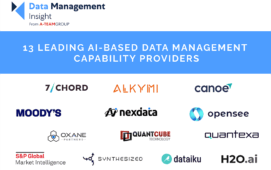We may have been waiting, watching for some time, and that time has now come: Markit has registered with the US Securities and Exchange Commission for an initial public offering.
No date, no share price. But still a momentous occasion for our marketplace, and a significant milestone for a company that opened its doors in 2003 – MarkIt Partners, anyone? – and has since built a business with over 3,000 customers worldwide and a 2013 EBITDA of $421.3 million on revenue of $947.9 million.
There is no valuation estimate, either. As you know, the last mark to, er, Markit was Temasek’s $500 million investment in the firm in return for a 10% stake, valuing it at $5 billion.
An IPO has been on the cards for a couple of years, ostensibly to allow it to fund itself for the long-haul battle vs. Thomson Reuters and Bloomberg. But the company held back as it continued to strengthen its product and service lines, and fill its ranks with experienced industry leaders.
A breeze through Markit’s regulatory filing in support of the IPO suggests that it has achieved its goals. All that’s left is to sell it to the marketplace.
Simple, right?
To be sure, it helps if you have friends in high places, and Markit has no shortage of those. Its list of underwriters for the offering – Bank of America Merrill Lynch, Barclays, Citigroup, Credit Suisse, Deutsche Bank, Goldman Sachs, HSBC, J.P. Morgan, Morgan Stanley, UBS Investment Bank, BNP Paribas, Jefferies, RBC Capital Markets, TD Securities – reads like a list of, erm, Markit shareholders.
We can’t be sure of that; it’s hard to get a full list of owners, and the filing doesn’t seem to offer any enlightenment. But moving on, the filing does offer up some tasty nuggets, heretofore buried in the luxuriant protection of private-companyness.
To wit: 2013 revenue close on $1 billion, of which 49.9% came from customers in the US, 40.3% from Europe and 9.8% from other geographic areas. Some 50.6% of revenue came from recurring fixed fees and 45.3% from recurring variable fees.
According to the prospectus, Markit has identified has a broad range of opportunities emanating from its wide spectrum of customers, including banks, hedge funds, asset managers, regulators, exchanges and central banks, and a breadth of products and services that are grouped into three divisions covering Information, Processing and Solutions.
The Information division includes its pricing and reference data services, and last year generated 48.5% of Markit’s total revenue. The Processing division provides trade-processing solutions for OTC derivatives, foreign exchange and syndicated loans, and last year generated 28% of total revenue.
For us, the most exciting division, though, is the Solutions group, home to the acquired Cadis EDM, QuIC risk management and other businesses. Its remit is to provide enterprise software platforms, managed services and hosted custom web solutions dedicated to data management and designed to help customers meet regulatory requirements and manage risk. The Solutions business generated 23.5% of revenue in 2013, which is about $223 million. At the time of acquisition, we reported
As we mentioned last week, reference data stalwart Brian Okupski is the most recent big-name recruit to Markit’s managed services portfolio, of which the most visible – to us – is the high-profile reference data management venture with iGate. Spun out of UBS – and somewhat controversially featuring former UBS CTO Michele Togni as part of the Markit team – this venture is a big deal for all parties.
The iGate/Markit deal is one of the three most significant ‘utility’ initiatives aimed at marketplace where participants are experiencing increasing pressure on costs and at the same time struggling with data management infrastructures that are coming to the end of their working lives.
Shared reference data management services seem to hold significant promise – as evidenced by the partnerships between SmartStream and
Euroclear (and DTCC? Stay tuned), and more recently (announced at our own Data Management Summit in March) between GoldenSource and IBM. All we need is some serious punters in a multi-tenant environment to prove the case.
Markit’s mantra for as long as we’ve known it has been to help the marketplace correct inefficiencies, and a utility for reference data seems right up its alley. With the iGate/UBS deal, it has bitten off a complex challenge, and some in the marketplace have expressed fear that the IPO could distract from the task in hand. We don’t know who among senior management will be distracted (read: minted) by the IPO, but perhaps the drafting in of Okupski as a safe pair of hands makes sense in this regard.
Seriously, though, Markit has entertained us all as a kind of teenager in the financial information space, and refreshing addition to the sometimes flat world of data it has been too. With the IPO, it is coming of age. For us, and surely for the marketplace at large, the risk is that it grows up to be as boring as our parents (with apologies to my Mother and Father, who are not boring at all).
I’m sure, though, that Lance won’t let that happen.
Subscribe to our newsletter




